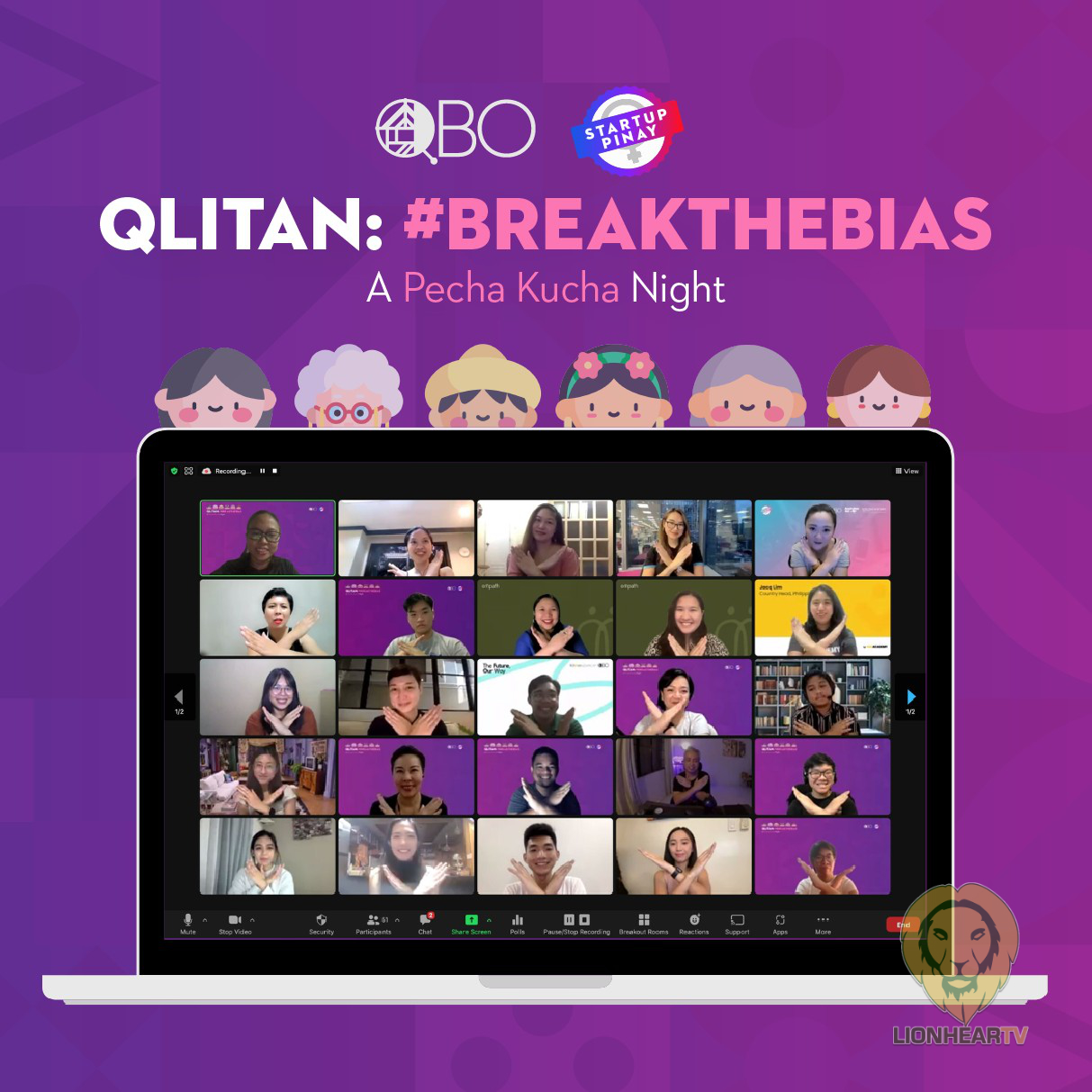The Philippines’ first public-private partnership platform for startups has always had women empowerment at the core of its mission, especially in an industry as male-saturated as the tech and startup industry. From major milestones such as key partnerships with organizations like Investing in Women and the establishment of the Startup Pinay initiative, to smaller but equally important events such as QBO’s monthly QLITANS, WORQSHOPS, and Startup Pinay BOOTQAMPS wherein the organization shines the spotlight on women-led startups and give them the platform and tools they need to succeed, QBO makes sure that they create a safe space for their community.

In line with this year’s theme of “Break the Bias”, the Women’s Month QLITAN utilized the engaging and unique pecha kucha format. Select speakers from the Startup Pinay community—industry leaders, startup newcomers, and enablers—were given 400 seconds and 20 images to share their own stories of how they broke and continue to break biases.
“My life has been a story of avoidance. Somehow, I managed to navigate to avoid biases—not because they don’t exist, but because I know that they do,” began Connected Women CEO and Co-Founder Gina Romero, who opened the floor with her highly-engaging and deeply personal story. As a daughter of a domestic overseas Filipino worker and a British driver, whose life started in the UK before returning to the Philippines with her parents to start their agri-preneur business, she talked about her struggle to find her personal balance—between privilege and humility, luck and misfortune, failure or success—and her own place in the world despite her unconventional life. She goes on to explain how this personal struggle eventually translated into her professional life. “I know what it’s like to not be able to fit in and to be underestimated. I’ve had to hide the fact that I was married to my co-founder when we set up our company, keep my pregnancies a secret, and avoid letting people know that I am not a degree holder.”
Nicole Medavillo, an undergraduate student, and Product Design Intern at Swarm, faced another internal struggle that feels all too familiar for many Filipino women—internal misogyny and self-deprecation.
“As early as my pre-college days, I’ve experienced both misogyny and internal misogyny in what seemed to be even the smallest details, which in hindsight, has led me to believe that I’m not good enough and that I need to push myself harder to earn even a speck of recognition,” said Medavillo. At her young age, she’s already had to spread herself too thinly, had to constantly prove herself at school and at home, downplay her own achievements, all under the guise for self-improvement and for the assurance of a secure future. “As women, we have to hustle twice as hard because we don’t want to get left behind. We know the system is against us. Too many times, I’ve had to stop myself and ask if this is all worth it. Honestly, I still don’t have the answer to that, but I know that it’s a process that starts with self-acknowledgement.”
Women across different fields and backgrounds have always felt that they had to deal with their experiences on their own, as well as learn to navigate their industries differently from their male counterparts—especially for male-dominated ones such as the startup industry.
“Being a woman in a startup is no joke. We’re here because we yearn to be part of the bigger mission to add value to our industry and contribute in a meaningful way. However, this yearning is countered by the demands of the startup life,” said Celine Veloso, Draper Startup House General Manager. She delves into the ups and downs—the continuous restructuring, employee turnovers, revenue and metric demands, generally longer hours, and ultimately, the challenge of being a woman. “It’s an added layer. I take extra time to plan what to wear, how to speak and present myself, all because I am a woman in a startup.”
Biases against women coupled with the rigorous demands of the workplace can take a toll on a person’s overall health and wellness. Which poses the question: until when will women have to live with this additional weight on their shoulders?
“In an unbiased world, we can be our authentic selves without any judgment. But to achieve this, we need to put in the work,” concluded Romero. “Let’s do our part to break the bias—starting with ourselves at home, until we can eventually take it to the workplace where we can empower our community to be intolerant against ignorance, discrimination, and disinformation.”
For a little over two hours, the pecha kucha format allowed people to be vulnerable within the safe space that QBO has created for its community. In just the six minutes assigned to them, audiences listened to the speakers’ innermost thoughts and personal struggles, and deeply resonated with them.
“At the end of the day, biases will continue to exist —affecting how women are perceived as leaders and fueling the persistent problem of women-led startups getting much less funding than men, among other issues. However, simply having a platform to shine a light on the issue can spark solutions.t’s through these moments of personal breakthroughs and shared experiences that we become aware of our prejudices, and can start to work towards a more empowered future for all.” said Katrina Rausa Chan, QBO Innovation Hub Executive Director
Even as Women’s Month has ended, the fight against biases and the mission to empower women, not only in tech but across all industries, continues.
“We hope that through these events, our community is inspired to be proud and make their stories known , because we believe they are shared experiences and can resonate with many Filipino women,” said Chan.
With QBO Innovation Hub and Startup Pinay, this is just the beginning as they plan to continue rolling out more initiatives, events, and programs geared towards their community of Filipino tech heroes, female leaders, newcomers, enablers, and allies.

